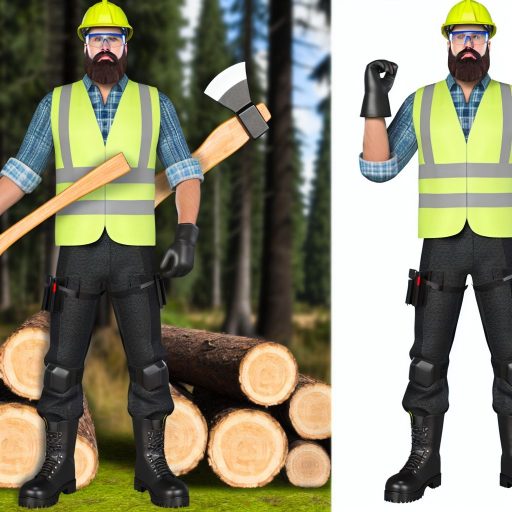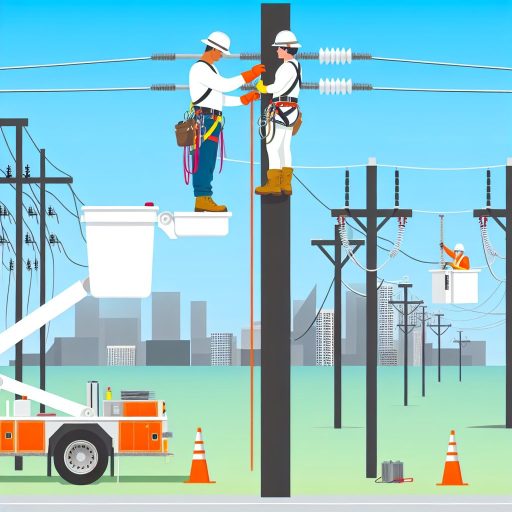Introduction
A boilermaker is a skilled tradesperson who fabricates and assembles boilers, vats, and other large vessels.
They play a crucial role in industries like construction, manufacturing, and energy production.
This blog post aims to provide a step-by-step guide on how to become a successful boilermaker.
Importance of Boilermakers
Boilermakers are essential in ensuring the safety and efficiency of various industrial processes.
They are responsible for constructing and repairing vessels that contain pressurized substances such as steam, gas, or liquids.
Without skilled boilermakers, industries like power generation, petrochemical, and shipbuilding would struggle to operate smoothly.
Steps to Become a Boilermaker
Step 1: Obtain High School Diploma or GED
The first step to becoming a boilermaker is to complete your high school education or obtain a General Educational Development (GED) certificate.
A strong foundation in math, science, and industrial arts can be beneficial for this career path.
Step 2: Pursue Vocational Training
After completing high school, aspiring boilermakers can enroll in a vocational or technical school to receive specialized training in welding, blueprint reading, metal fabrication, and safety procedures.
This hands-on training will provide the necessary skills to succeed in the field.
Step 3: Complete Apprenticeship Program
Many aspiring boilermakers opt to participate in a formal apprenticeship program, which typically lasts 4-5 years.
During the apprenticeship, individuals work under the supervision of experienced professionals to gain practical experience and knowledge of the trade.
Step 4: Obtain Certification
Upon completing the apprenticeship program, boilermakers can pursue certification to demonstrate their competency and skills.
Certification requirements vary by state, but typically involve passing a written exam and meeting certain work experience criteria.
Step 5: Gain Work Experience
After becoming certified, it is essential to gain practical work experience in the field.
Transform Your Career Today
Unlock a personalized career strategy that drives real results. Get tailored advice and a roadmap designed just for you.
Start NowBoilermakers can work for construction firms, industrial plants, boiler manufacturers, or maintenance companies to hone their craft and expand their expertise.
By following these steps, aspiring boilermakers can build a successful career in this rewarding and dynamic profession.
With dedication, hard work, and continuous learning, individuals can excel as boilermakers and contribute to the growth and success of various industries.
Research and Understand the Role of a Boilermaker:
Before diving into the steps to become a boilermaker, it is essential to have a clear understanding of what the role entails.
Here is a breakdown of the key aspects:
Definition of a Boilermaker:
- A boilermaker is a skilled tradesperson who fabricates, assembles, and repairs boilers, vats, and other large vessels that hold liquids and gases.
- They work in various industries, including construction, manufacturing, and power generation.
Responsibilities and Duties of a Boilermaker:
- Reading blueprints, specifications, and plans to determine the layout and installation of boilers.
- Using hand and power tools to cut, shape, and weld metal components.
- Inspecting and testing boiler systems for leaks or defects.
- Ensuring compliance with safety standards and regulations.
Skills and Qualifications Needed to Become a Successful Boilermaker:
- Strong mechanical aptitude and problem-solving skills.
- Ability to read and interpret technical drawings and schematics.
- Proficiency in welding techniques, including stick, MIG, and TIG welding.
- Physical stamina and strength to work in demanding environments.
- Completion of a formal apprenticeship program or vocational training.
By understanding these aspects of the boilermaker role, you can gauge whether it aligns with your interests and abilities before pursuing a career in this field.
Get the Necessary Education and Training:
- High school diploma or GED requirement
- Vocational training programs available for aspiring boilermakers
- Apprenticeship opportunities to gain hands-on experience
High School Diploma or GED Requirement:
To become a boilermaker, you need to have at least a high school diploma or GED equivalent.
This serves as the foundation for further education and training in the field.
Vocational Training Programs:
Aspiring boilermakers can enroll in vocational training programs offered by technical schools or community colleges.
These programs provide a combination of classroom instruction and hands-on training.
Apprenticeship Opportunities:
Another pathway to becoming a boilermaker is through apprenticeship programs.
These programs allow individuals to learn the trade from experienced professionals while earning a wage.
Develop Technical Skills and Knowledge:
Boilermakers need to have a strong foundation in technical skills and knowledge related to the construction and repair of boilers, tanks, and other large vessels.
This includes understanding blueprint reading, welding techniques, and safety protocols.
Blueprint Reading:
Boilermakers must be able to interpret and work from technical drawings and blueprints.
This skill is essential for understanding the specifications and dimensions of the structures they work on.
Welding Techniques:
Proficiency in welding is crucial for boilermakers, as welding is often a key component of boiler construction and repair.
Boilermakers must be skilled in various welding techniques to ensure the structural integrity of their work.
Safety Protocols:
Safety is a top priority in the boilermaker profession.
Showcase Your Business Today
Reach thousands of readers actively exploring professional services. Publish your business profile and grow your audience now.
Publish NowBoilermakers must have a strong understanding of safety protocols and procedures to prevent accidents and injuries while working on complex and potentially hazardous projects.
Gain Practical Experience:
Practical experience is essential for aspiring boilermakers to hone their skills and knowledge in real-world settings.
This can be achieved through internships, work-study programs, or on-the-job training opportunities.
Internships:
Some technical schools and vocational training programs offer internships that allow students to work alongside experienced professionals in the field.
This hands-on experience is invaluable for developing practical skills.
Work-Study Programs:
Work-study programs provide students with the opportunity to gain practical experience while completing their education.
These programs typically combine classroom learning with hands-on work experience.
On-the-Job Training:
Many boilermakers start their careers with on-the-job training opportunities that allow them to learn by doing.
Working under the guidance of experienced professionals, apprentices can gain practical skills and knowledge.
Obtain Certification and Licensure:
In some regions, boilermakers may be required to obtain certification or licensure to work in the field.
This typically involves passing an exam to demonstrate proficiency in the trade.
Certification:
Certification for boilermakers may be offered by industry organizations or trade associations.
Boilermakers can pursue certification to demonstrate their expertise and competency in the field.
Licensure:
Some jurisdictions may require boilermakers to obtain a license to work in the field.
Licensure typically involves meeting certain education and experience requirements, as well as passing an exam.
Maintain Continuing Education:
Boilermakers should stay current with advances in the industry by participating in continuing education programs and training opportunities.
This helps them expand their skills and stay competitive in the field.
Pathway to a Rewarding Career:
Becoming a boilermaker requires a combination of education, training, technical skills, and practical experience.
By following these steps and investing in your development, you can pursue a rewarding career in this specialized field.
Find Out More: Innovative Trends in Landscape Architecture 2025
Welding Certifications and Licenses:
Complete a welding training program to gain hands-on experience.
Obtain certifications such as Certified Welder (CW) or Certified Structural Welder (CSW).
Pass welding performance tests to demonstrate your skills and proficiency.
Apply for welding licenses in your state to legally practice as a welder.
Other Industry-Specific Certifications:
Consider obtaining certifications such as ASME Welding Certifications or NBIC Certifications.
Participate in training programs offered by industry organizations or trade unions.
Attend workshops and seminars to stay updated on the latest industry trends and techniques.
Seek certifications in specialties such as pressure vessel welding or pipe welding.
Importance of Staying Up-to-Date with Industry Standards:
Regularly review and adhere to industry standards and regulations to ensure compliance.
Stay informed about changes in codes and requirements to maintain safety and quality standards.
Participate in continuing education programs to expand your knowledge and skills in the field.
Renew certifications and licenses as needed to stay current with industry expectations.
By obtaining relevant certifications and licenses, you can enhance your credibility as a boilermaker.
Demonstrate your commitment to excellence in the field.
Stay proactive in pursuing additional certifications and staying up-to-date with industry standards.
Thrive in your career as a boilermaker.
Gain More Insights: Understanding Overtime Rules for Dockworkers
Gain Practical Experience through Apprenticeships:
When it comes to becoming a successful boilermaker, gaining practical experience through apprenticeships is crucial.
This hands-on training allows individuals to learn the necessary skills and techniques from experienced professionals in the field.
Here are some key benefits of joining a boilermaker apprenticeship program:
Showcase Your Business Today
Reach thousands of readers actively exploring professional services. Publish your business profile and grow your audience now.
Publish NowBenefits of Joining a Boilermaker Apprenticeship Program:
Apprenticeships provide a structured learning environment where individuals can receive hands-on training while working alongside seasoned professionals.
By participating in an apprenticeship program, aspiring boilermakers gain invaluable real-world experience that cannot be replicated in a classroom setting.
Completing an apprenticeship program can lead to obtaining industry-recognized credentials, which can boost one’s credibility and open up more job opportunities.
Apprenticeships offer the opportunity to receive personalized mentorship from experienced boilermakers who can provide guidance and support throughout the learning process.
Apprenticeships involve hands-on training that allows individuals to practice their skills in a real-world setting, helping them become proficient in the craft.
Learning On-the-Job Skills and Techniques:
Apprentices learn various welding techniques used in boilermaking, such as arc welding, TIG welding, and MIG welding.
Apprentices are taught how to read and interpret blueprints, which are essential for fabricating and assembling boilers and other metal structures.
Apprentices develop critical thinking and problem-solving skills by working on complex projects and finding solutions to challenges that arise.
Apprentices learn how to operate and maintain various tools and equipment used in boilermaking, ensuring they can work efficiently and safely.
Apprentices are trained in quality control measures to ensure that their work meets industry standards and regulations.
Networking Opportunities within the Industry:
Apprenticeships provide opportunities to network with professionals in the field, which can lead to job offers, collaborations, and mentorship.
By interacting with experienced boilermakers and industry experts, apprentices gain valuable insights into the latest trends, technologies, and best practices in the field.
Some apprenticeship programs may lead to job placement opportunities, as employers often prefer to hire individuals who have completed a formal apprenticeship.
Networking within the industry can help apprentices enhance their professional development, expand their knowledge base, and stay informed about career advancement opportunities.
Building a network of industry contacts can provide apprentices with a support system of like-minded individuals who can offer guidance, advice, and assistance throughout their career.
Uncover the Details: Environmental Impact of Lumberjack Work
Develop Essential Skills for Success:
Boilermaking requires a unique set of skills that are essential for success in this field.
If you are considering becoming a boilermaker, it is important to develop and hone these skills to excel in your career.
Strong welding and metalworking skills:
One of the most crucial skills for a boilermaker is strong welding and metalworking skills.
Boilermakers are responsible for fabricating and assembling metal parts to construct or repair boilers, tanks, and other containers.
To excel in this role, you must be proficient in various welding techniques and have a deep understanding of metalworking processes.
Attention to detail and precision in measurements:
Boilermakers work with precise measurements to ensure the structural integrity and safety of the equipment they build.
Attention to detail is crucial in following blueprints, plans, and specifications accurately.
A small error in measurement can have serious consequences, so it is essential to be meticulous and precise in your work.
Ability to work in diverse environments and conditions:
Boilermakers often work in a variety of environments, including construction sites, industrial plants, and manufacturing facilities.
They may work outdoors in all weather conditions or in confined spaces.
As a boilermaker, you must be adaptable and prepared to work in diverse environments and conditions, sometimes requiring physical strength and stamina.
Developing essential skills such as strong welding and metalworking skills, attention to detail, and the ability to work in diverse environments are critical for success as a boilermaker.
By honing these skills and continuously improving your craft, you can build a successful and rewarding career in this challenging field.
See Related Content: Effective Waste Disposal Methods in Construction

Build a Solid Resume and Portfolio:
When pursuing a career as a boilermaker, having a strong resume and portfolio is essential to stand out to potential employers.
Here are some key tips to help you build a solid resume and portfolio:
- Highlighting relevant education, training, certifications, and experience:
- Showcasing successful projects and accomplishments in the field:
- Tailoring resume and portfolio to specific job opportunities in the boilermaker industry:
Include any relevant education or training programs you have completed related to boilermaking.
Certifications such as welding certifications can also be beneficial.
Highlight any previous work experience, especially if it involved similar skills or tasks.
Include details of any successful projects you have worked on in the past.
Mention any specific accomplishments or contributions you made to these projects.
This can give employers an insight into your skills and capabilities.
Customize your resume and portfolio for each job application.
Highlight the skills and experiences that are most relevant to the specific role you are applying for.
Showcase Your Business Today
Reach thousands of readers actively exploring professional services. Publish your business profile and grow your audience now.
Publish NowThis shows employers that you have taken the time to understand their needs and are a good fit for the position.
By following these tips, you can create a compelling resume and portfolio that effectively showcases your qualifications and experiences as a boilermaker.
Remember, first impressions are important, so take the time to craft a professional and well-organized document to make a positive impact on potential employers.
Search for Job Opportunities and Apply:
When you have completed your training and gained experience in the field of boilermaking, the next step is to search for job opportunities and apply to secure a job in this profession.
Here are some steps you can take:
Researching companies that hire boilermakers:
- Start by researching companies in your area or in locations where you are willing to relocate that hire boilermakers.
- Look for companies in industries such as construction, manufacturing, shipbuilding, and oil and gas, as these are common industries that require boilermakers.
- Visit the websites of these companies to learn more about their operations, the type of work they do, and any current job openings they may have for boilermakers.
- Check job search websites, professional networking platforms, and industry-specific job boards for boilermaker job listings.
Networking with industry professionals for job leads:
- Attend industry events, conferences, trade shows, and career fairs to network with professionals in the boilermaking field.
- Join professional organizations and associations for boilermakers to connect with others in the industry and gain access to job leads.
- Reach out to former classmates, instructors, or colleagues who may have job leads or connections in the industry that could help you secure a job.
- Utilize social media platforms like LinkedIn to connect with industry professionals, participate in relevant groups, and stay updated on job openings.
Polish interview skills and prepare for job applications:
- Prepare a professional resume that highlights your skills, experience, and qualifications as a boilermaker.
- Write a compelling cover letter that showcases your interest in the job, your relevant experience, and why you are a good fit for the position.
- Practice common interview questions and prepare responses that demonstrate your knowledge of boilermaking, your work ethic, and your problem-solving skills.
- Research the company you are applying to and prepare questions to ask during the interview to show your interest and knowledge about the company.
By following these steps and actively searching for job opportunities, networking with industry professionals, and preparing for the job application process, you can increase your chances of landing a job as a boilermaker in the industry of your choice.
When it comes to becoming a successful boilermaker, the journey doesn’t end once you’ve landed a job.
Continuous professional development and growth are essential to stay relevant in the industry and advance your career.
Here are some key steps to consider:
Joining Professional Organizations for Boilermakers
One way to stay connected with other professionals in the field is by joining professional organizations that cater to boilermakers.
These organizations often provide networking opportunities, resources, and access to industry events.
By becoming a member of a professional organization, you can stay updated on the latest industry trends, regulations, and best practices.
This can help you enhance your skills and knowledge, making you a more valuable asset to your employer.
Attending Workshops, Seminars, and Conferences
Another great way to continue your professional development is by attending workshops, seminars, and conferences related to the boilermaking industry.
These events often feature expert speakers, hands-on training sessions, and networking opportunities.
By participating in these events, you can learn new techniques, technologies, and industry standards.
This can help you stay ahead of the curve and remain competitive in the job market.
Additionally, you may also have the chance to showcase your skills and expertise to potential employers or clients.
Seeking Promotions and Advancement Opportunities
As you gain experience and knowledge in the field of boilermaking, it’s important to seek out promotions and advancement opportunities within your current organization.
This may involve taking on more responsibilities, pursuing additional certifications, or completing advanced training programs.
By demonstrating your commitment to professional growth and development, you can showcase your potential for higher-level positions and leadership roles.
This can lead to increased job satisfaction, financial rewards, and greater opportunities for career advancement.
Continuous professional development and growth are essential for boilermakers who want to achieve long-term success in the industry.
By joining professional organizations, attending industry events, and seeking advancement opportunities, you can take your career to new heights and stand out as a top performer in your field.
Steps to Becoming a Boilermaker
Becoming a boilermaker involves several key steps that require dedication and hard work.
By following the step-by-step guide outlined in this post, you can embark on a journey towards a rewarding career in this field.
Aspiring boilermakers should not be discouraged by the challenges they may face along the way.
Instead, they should remain focused on their career goals and continue to push themselves to succeed.
Ultimately, success in the field of boilermaking requires perseverance, skill, and a commitment to excellence.
By following the advice in this guide and staying determined, you can achieve your dreams of becoming a skilled and successful boilermaker.
Additional Resources
Reasonable Accommodations in the Workplace | ADA National …
Construction Contractors Technical Assistance Guide
[E-Books for Sale]
The Big Book of 500 High-Paying Jobs in America: Unlock Your Earning Potential
$19.99 • 500 High-Paying Jobs • 330 pages
Explore 500 high-paying jobs in America and learn how to boost your career, earn more, and achieve success!
See All 500 High-Paying Jobs of this E-Book
1001 Professions Without a Degree: High-Paying American Jobs You Can Start Now
$19.99 • 1001 Professions Without a Degree • 174 pages
Discover 1001 high-paying jobs without a degree! Unlock career tips, skills, and success strategies for just $19.99!




